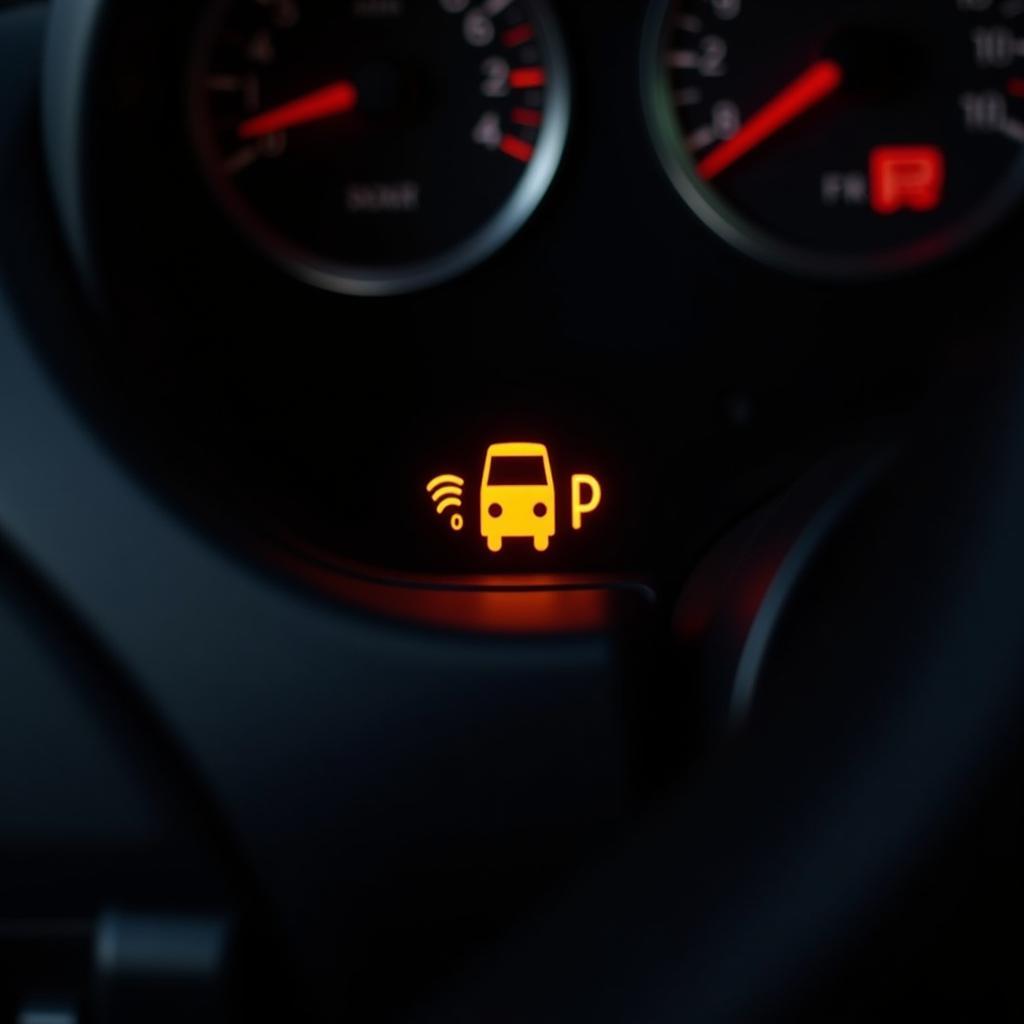The brake light warning on your 2001 Toyota Camry is a crucial safety feature designed to alert other drivers when you’re slowing down or stopping. If this light flickers on or stays illuminated, it’s essential to address the issue promptly. This article delves into the common reasons behind a 2001 Camry brake light warning and provides a step-by-step guide to help you diagnose and potentially fix the problem yourself.
Understanding Your Brake Light System
Before diving into troubleshooting, it’s helpful to grasp the basics of how your Camry’s brake light system works. Here’s a simplified explanation:
- Brake Pedal: When you press the brake pedal, a switch connected to it activates.
- Brake Light Switch: This switch acts as a messenger, sending an electrical signal to the brake lights.
- Brake Lights: Upon receiving the signal, the brake light bulbs illuminate, signaling to drivers behind you.
Common Causes of a 2001 Camry Brake Light Warning
Several culprits can trigger a brake light warning on your 2001 Camry. Here are some of the most prevalent:
1. Burnt-Out Brake Light Bulbs
The simplest and most frequent reason for a brake light warning is a burnt-out bulb. Brake light bulbs have a limited lifespan and will eventually need replacement.
Troubleshooting:
- Visual Inspection: Have a friend or family member press the brake pedal while you visually inspect each brake light. Look for bulbs that are dim, flickering, or completely out.
- Bulb Replacement: If you find a burnt-out bulb, replace it with a new one of the correct type. Refer to your owner’s manual for bulb specifications.
2. Faulty Brake Light Switch
A malfunctioning brake light switch is another common culprit. Over time, the switch can wear out, break, or become misaligned, disrupting the electrical connection.
Troubleshooting:
- Testing the Switch: With the engine off and the parking brake engaged, locate the brake light switch (usually mounted above the brake pedal). Gently depress the switch plunger. If the brake lights don’t illuminate, the switch is likely faulty and needs replacement.
3. Blown Fuse
A blown fuse in the brake light circuit can interrupt the flow of electricity to the lights, triggering the warning.
Troubleshooting:
- Checking the Fuse Box: Consult your owner’s manual to locate the fuse box (usually under the dashboard or hood). Identify the fuse associated with the brake lights.
- Inspecting the Fuse: Carefully remove the fuse and examine it. A blown fuse will have a broken wire or a darkened glass tube.
- Replacing the Fuse: If the fuse is blown, replace it with a new one of the same amperage rating.
4. Wiring Problems
Worn-out, damaged, or corroded wiring in the brake light circuit can also lead to a warning light.
Troubleshooting:
- Visual Inspection: Carefully inspect the wiring harness leading to the brake lights for any visible signs of damage, fraying, or corrosion.
- Professional Assistance: If you suspect a wiring issue, it’s best to consult a qualified mechanic for diagnosis and repair. Repairing electrical systems can be complex and potentially dangerous.
5. Aftermarket Accessories
Installing aftermarket accessories that tap into the brake light circuit, such as trailer lights or custom taillights, can sometimes cause electrical issues leading to a warning light.
Troubleshooting:
- Disconnecting Accessories: Temporarily disconnect any recently installed aftermarket accessories connected to the brake lights. If the warning light goes off, the accessory or its installation might be the problem.
- Professional Installation: Ensure any aftermarket accessories are installed correctly by a qualified professional to prevent electrical complications.
When to Seek Professional Help
While some brake light issues can be addressed with basic DIY troubleshooting, it’s essential to recognize when professional assistance is necessary:
- Complex Electrical Issues: If you suspect a complex electrical problem, such as faulty wiring within the vehicle’s harness, seeking professional help is recommended.
- Lack of Expertise: If you’re uncomfortable or unfamiliar with automotive electrical systems, it’s always best to err on the side of caution and consult a qualified mechanic.
Importance of Addressing Brake Light Issues
A functioning brake light system is crucial for your safety and the safety of others on the road. Ignoring a brake light warning can:
- Increase the Risk of Accidents: Malfunctioning brake lights can lead to rear-end collisions, as drivers behind you won’t be adequately warned when you’re braking.
- Result in Traffic Violations: Driving with a brake light out is a traffic violation in most jurisdictions and can lead to fines.
Conclusion
Addressing a brake light warning on your 2001 Toyota Camry is essential for your safety and the well-being of others on the road. By understanding the common causes and following the troubleshooting steps outlined in this article, you can often diagnose and even fix the issue yourself. However, remember to prioritize safety and seek professional assistance when needed.
FAQs:
- Can I drive my Camry with a brake light out?
It’s strongly discouraged to drive with a brake light out. It’s a safety hazard and a traffic violation in most places.
- How much does it cost to replace a brake light bulb?
Brake light bulbs are relatively inexpensive, typically costing a few dollars each.
- How often should I replace my brake light bulbs?
It’s a good practice to inspect your brake lights every few months and replace any dim or burnt-out bulbs.
- Can I replace a brake light switch myself?
Replacing a brake light switch is a relatively straightforward DIY task for those comfortable with basic automotive repairs. However, if you’re unsure, consult a mechanic.
- Where can I find a qualified mechanic to inspect my Camry’s brake lights?
You can search online for reputable mechanics in your area or ask for recommendations from friends or family.

